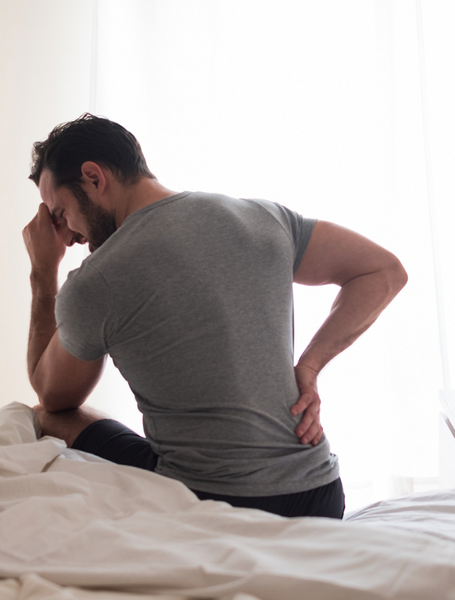Do you who dread waking up each morning due to hip pain while sleeping? Do you find yourself fighting a persistent ache that never quite goes away? You're not alone! this is an all too common problem that many people face.
The good news is, that there are simple and effective ways that can help alleviate hip pain and improve your quality of sleep.
In this post, we'll explore some causes of hip pain while sleeping and provide you with actionable tips to get a good night's rest.

Hip Pain While Sleeping - Identifying Causes:
Areas for concern:
Understanding the source of your hip discomfort is an important first step toward acquiring relief. More serious issues such as hip arthritis, labrum tears, bursitis, tendonitis, and sciatica all necessitate expert diagnosis and treatment.
Less severe causes:
On the less severe side, things such as sleeping positions could lead to hip pain. This can lead to hip misalignment and chronic pain at night. Many people prefer sleeping on their side with one leg crossed over the other. While this may feel comfortable for people at the moment, it's often a likely cause of hip pain while sleeping.
How to Relieve Hip Pain - Sleeping Position:
The best position to prevent hip pain while sleeping is lying flat on your back with your legs straight out and slightly spread. It may be uncomfortable at first if you're a "side sleeper" but this will keep the muscles in a safe position and prevent stiffness.
If you prefer sleeping on your side, try placing a pillow between your legs/knees to take off some of the stress off your hip.

Identifying the Common Roots of Hip Pain While Sleeping:
Muscle stiffness:
Another big cause of hip pain while sleeping is muscle stiffness. A few common causes include; overuse or strain, inactivity, bad posture, muscle fatigue, stress and tension, and inflammation.
Muscles that lie in the front of the hips such as the psoas, iliacus, and Tensor Facsiae Latae (IT Band) (See Images left -right) have a large effect on the mobility and pain patterns of the hips.
Front Hip Muscles:



Glute Muscles:
Glute muscles such as the gluteus medius, gluteus minimus, and piriformis are also receptive to becoming tight and causing pain.



When both sets of front hip and glute muscles become tight, they can cause stiffness and a great deal of hip pain while sleeping.
How to Relieve Hip Pain While Sleeping:
To relieve hip pain while sleeping, you need to prevent tightness in the muscles that are causing you pain. An easy way to do this is through muscle massage. Find the tight areas that are causing you pain and break up the muscle fibers through deep tissue massage. A great tool designed for tight hip muscles is The QL Claw. The QL Claw is an easy and versatile tool made specifically for getting into those hard-to-reach places and breaking up tight muscle tissue. Below is a video on how to use the QL Claw to release the iliacus, psoas, and TFL.
How to Relieve Hip Pain While Sleeping: Stretching Guide
Using massage techniques to relieve pain while sleeping is a surefire way to release some of the built-up tension in your hips. Another great way to further your relief and improve flexibility is through stretching. The top muscles related to hip pain while sleeping are the TFL (IT Band), the iliacus, and the psoas. Isolating these three muscles by elongating the tight tissue will offer a higher form of muscle relief and mobility. Below is a video on how to release the IT band muscle along with an awesome stretch that is sure to give back some needed flexibility to the muscle.
How to Relieve Hip Pain While Sleeping - Summary:
Breaking up the tight muscle fibers through deep tissue massage combined with isolated stretching is an effective and easy way to bring relief to the hip muscles. After doing so, it is important to sleep in a position that is going to stretch the muscles and not keep them compressed.
Now that you've read about fixing hip pain while sleeping, read more about how to sleep with piriformis syndrome, lateral hip pain, or internal hip rotation stretch!
Sources:
[1] Davies, Clair, and Amber Davies. The Trigger Point Therapy Workbook: Your Self-Treatment Guide for Pain Relief. 3rd ed., New Harbinger Publications, Inc., 2013.


